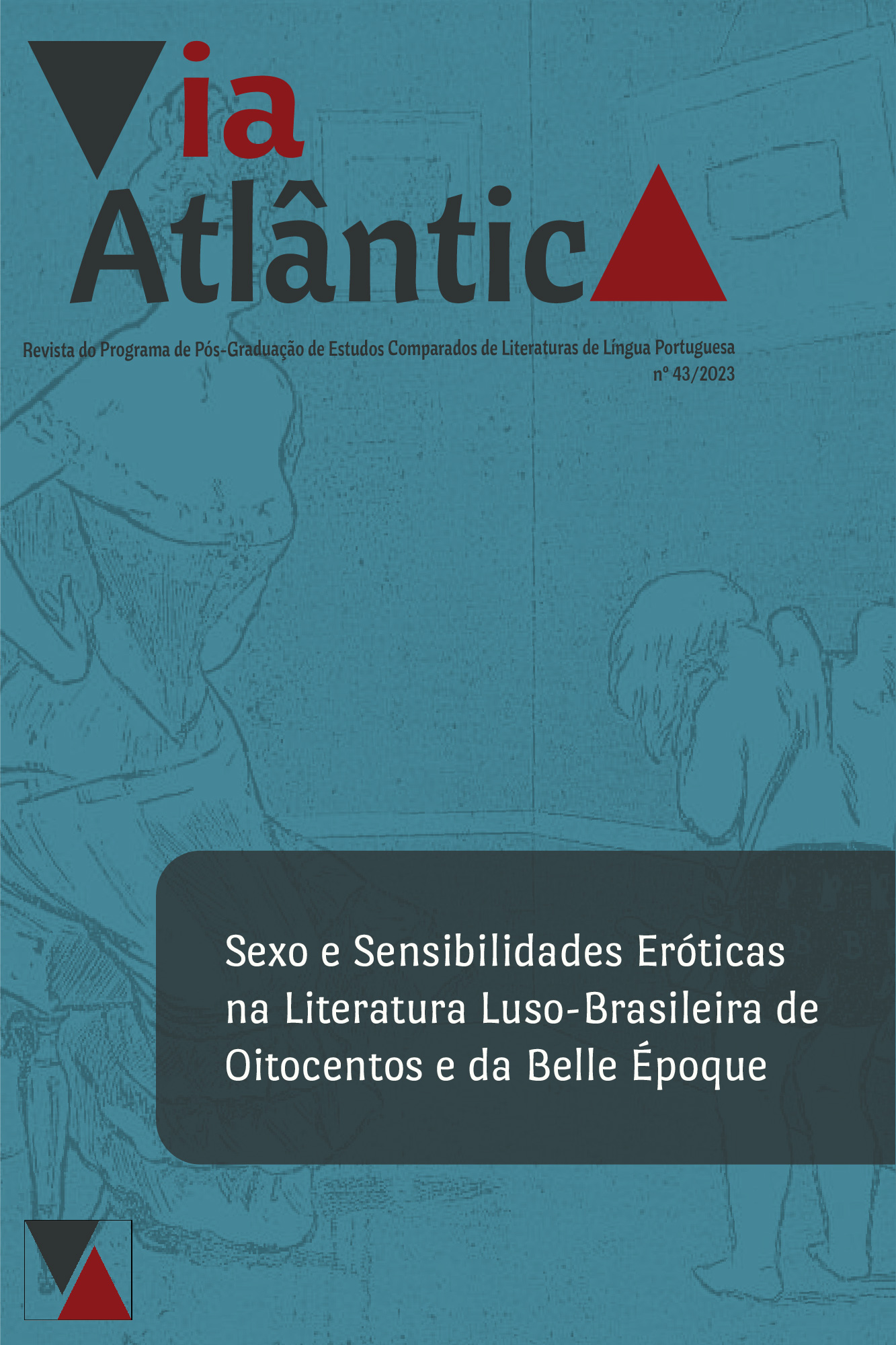Freedom is a vertigo: prostitution and lesbianity in the literature of the 19th century
DOI:
https://doi.org/10.11606/va.i43.196615Keywords:
prostitution, literature, 19th century, lesbianitiesAbstract
One of the aspects present in most prostitutes in the literature is the impact of the attempt to control bodies by various spheres of power. In this article, we intend to observe the emergence of prostitute characters in 19th-century literature, from the definitions of prostitution and its variations over time, how such definitions impact the creation of characters and which dialogues Brazilian literary established with some of the French narratives about the imaginary of 19th-century prostitution. Furthermore, when speculating on such variations, we will discuss the perceptible changes over the 19th century in the formulation of these characters in literature.
Downloads
References
ALENCAR, José de. Lucíola. São Paulo: FTD, 1997.
AZEVEDO, Aluísio. O Cortiço. São Paulo: Panda Books, 2017.
BAUDELAIRE, Charles. As flores do mal. São Paulo: Penguim Classics Companhia das Letras, 2019.
BEAUVOIR, Simone. O Segundo sexo. Rio de Janeiro: Nova Fronteira, 2009.
BILAC, Olavo. Poesias. Organização e prefácio de Ivan Teixeira. São Paulo, Martins Fontes, 1997
CORBIN, Allain. Os Bastidores. IN: PERROT, Michele (org). História da vida privada, 4: Da Revolução Francesa à Primeira Guerra. São Paulo: Companhia das Letras, 2009. p. 387-525.
DUMAS FILHO, Alexandre. A Dama das Camélias. São Paulo: Nova Alexandria, 2001.
FEDERICI, Silvia. O Calibã e a Bruxa: Mulheres, corpo e acumulação primitiva. São Paulo: Elefante, 2017.
GUIMARÃES, Júlio C. Introdução. In: BAUDELAIRE, Charles. As flores do mal. São Paulo: Penguim Classics Companhia das Letras, 2019. p.7-21.
HERNANDEZ, Enrique Andres Carretero. Prostituição feminina na Mélica e no Jambo arcaicos: imagens e temas. 2019. Dissertação (Mestrado em Letras Clássicas) - Faculdade de Filosofia, Letras e Ciências Humanas, Universidade de São Paulo, São Paulo, 2019. Disponível em Tese Enrique Hernandez . Acesso em: 06 abr 2022.
KIRSCH, Jonathan. As prostitutas na Bíblia: algumas histórias censuradas. Rio de Janeiro: Record: Rosa dos Tempos, 1998.
KRAFFT-EBBING, R. Psicopatologia Sexualis. São Paulo: Martins Fontes, 2001
LOMBROSO, Cesare. O homem delinqüente. São Paulo: Ícone, 2007.
MACEDO, Ana Gabriela, AMARAL, Ana Luisa (orgs.). Dicionário da Crítica Feminista. Porto: Edições Afrontamento, 2005.
MORAES, Eliane Robert. O efeito obsceno. Cadernos pagu (20) 2003: pp.121-130.
PRÉVOST, Abade. A história do Cavaleiro de Grieux e de Manon Lescaut. São Paulo: Martin Claret, 2010
RAGO, Margareth. Os prazeres da noite: prostituição e códigos da sexualidade feminina em São Paulo (1890-1930). 1990. Tese (Doutorado em História) – IFCH, Universidade de Campinas, São Paulo, 2019.
ROBERTS, Nickie. As prostitutas na história. Rio de Janeiro: Record: Rosa dos Tempos, 1998
TEIXEIRA, Ivan. Olavo Bilac: Artifício, Persuasão e sociedade. REVISTA USP, São Paulo, n.54, p. 98-111, junho/agosto 2002
VIEIRA, Patrício de Albuquerque. Epitáfio para Luísa e Irene: prostituição, solidão e morte no romance brasileiro. 2016. 198 p. Tese. Doutorado em Literatura e Interculturalidade. Universidade Estadual da Paraíba. Centro de Educação, 2016. Disponível em: Tese Patrício Vieira . Acesso em 8 abr 2022.
VILLARES, Laura. Vertigem. São Paulo: Ed. Antonio Tisi, 1926.
ZOLA, Émile. Naná. São Paulo: Civilização Brasileira, 2013.
Downloads
Published
Issue
Section
License
Copyright (c) 2023 Claudiana Gois dos Santos

This work is licensed under a Creative Commons Attribution 4.0 International License.
Authors who publish with this journal agree to the following terms:
- Authors retain copyright and grant the journal right of first publication with the work simultaneously licensed under a Creative Commons Attribution License that allows others to share the work with an acknowledgement of the work's authorship and initial publication in this journal.
- Authors are able to enter into separate, additional contractual arrangements for the non-exclusive distribution of the journal's published version of the work (e.g., post it to an institutional repository or publish it in a book), with an acknowledgement of its initial publication in this journal.
- Authors are permitted and encouraged to post their work online (e.g., in institutional repositories or on their website) prior to and during the submission process, as it can lead to productive exchanges, as well as earlier and greater citation of published work (See The Effect of Open Access).



















